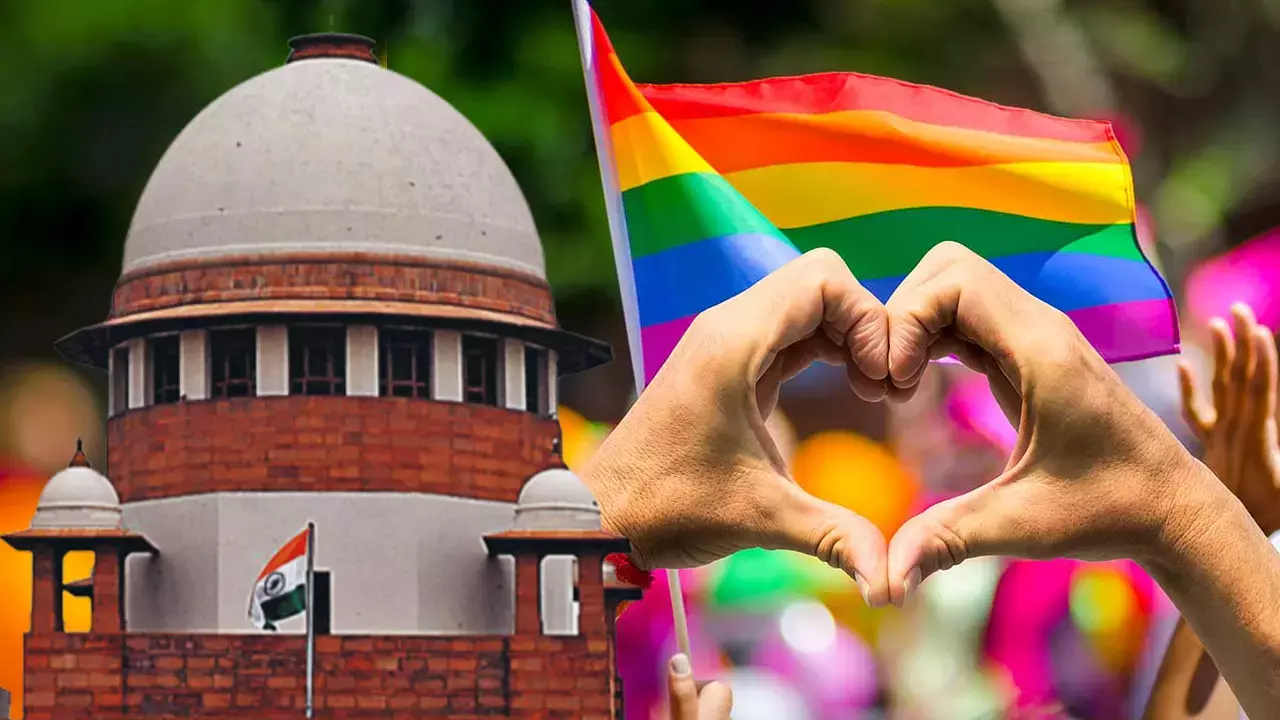Same sex marriage
Date: 11-05-2023
In Context
- The Union government expressed its disagreement towards same-sex marriage pointing out that it would cause complete havoc with the delicate balance of personal laws and accepted societal values.
- According to the government, marriage between a biological man and woman is a “holy union, a sacrament and a sanskar” in India.
-
What is Same-Sex Marriage?
- It is the practice of marriage between two men or between two women.
- Same-sex marriage has been regulated through law, religion, and custom in most countries of the world.
- As of 2023, marriage between same-sex couples is legally performed and recognized in 34 countries, constituting some 1.35 billion people (17% of the world's population), with the most recent being Andorra.

- Petitioner’s Arguments
- Petitioners argued that the non-recognition of same-sex marriage amounted to discrimination that struck at the root of the dignity and self-fulfillment of LBTQ+ couples.
- It demanded that the Special Marriage Act, 1954 should grant same-sex couples the same protection it allowed inter-caste and inter-faith couples who want to marry.
-
Same sex marriage legality
- There is no explicit mention of homosexuality or homophilic in any of the statute books of India.
- A person cannot be prosecuted for being a homosexual or homophilic.
- The sexual act of sodomy is a criminal offense.
- The major provisions of criminalisation of same-sex acts are found in Section 377 of the Indian Penal Code (IPC) of 1860.
- The 2018 Navtej Singh Johar judgment decriminalised homosexuality, but it did not mention/legitimise same-sex marriage.
- The court, while decriminalising homosexuality, had never accepted same-sex marriage as part of the fundamental right to life and dignity under Article 21 of the Constitution.
- Registration of marriage of same-sex persons would also result in violation of existing personal as well as codified law provisions.
-
Arguments in favour of legalising Same-Sex Marriage
- The Special Marriage Act of 1954:
- It provides a civil form of marriage for couples who cannot marry under their personal law.
- Fundamental Right:
- Right to marry a person of one's choice is a fundamental right guaranteed under the Article 21 of the Constitution of India.
- Members of the LGBTQ+ community have the same human, fundamental and constitutional rights as other citizens.
- Right to equality:
- The petitioners have argued that barring them from marriage violates their right to equality.
- Global practice:
- According to global think tank Council of Foreign Relations, same sex marriages are legal in at least 30 countries, including the United States, Australia, Canada and France.
-
Arguments against Same Sex Marriage
- Social Stigma: Apart from the harsh legal scenario, homosexuals face social stigma.
- Any instance of sexual relations between a couple of the same sex draws hatred and disgust.
- Intimacy of any sort is not approved of unless it is legitimized in the form of marriage where socially approved sexual access takes place.
- Rising activism: Campaigns for lesbian and gay rights taken on an increasingly radical character, arguing for an end to all forms of discrimination against homosexuality.
- Progeny Issues: Gay and lesbian couples are also not allowed to have children born with the help of an Indian surrogate mother.
- An LGBTQ+ person can apply to the Central Adoption Review Authority for adoption only as a single parent.
- Patriarchal Society: Indian society is patriarchal which believes that hetrosexual marriage was the norm throughout history and are “foundational to both the existence and continuance of the state.
-
Way Ahead
- Awareness campaigns are a must to sensitise society about the rights of all individuals.
- As people’s relationships change, and society undergoes transformation, constitutional rights on freedoms and liberties must extend to every sphere, including a same-sex couple’s life.
- As of 2023, marriage between same-sex couples is legally performed and recognized in 34 countries, constituting some 1.35 billion people (17% of the world's population), with the most recent being Andorra.
